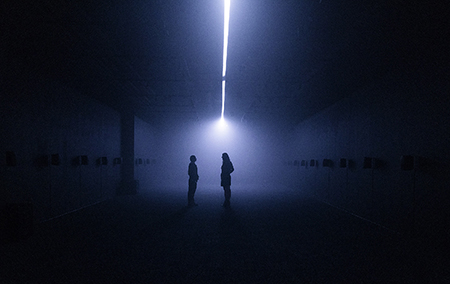
Continuing through July 30, 2023
FLÓÐ (Flood) is an immersive installation by Jónsi that manages three noteworthy things. First, it addresses dire questions regarding climate change without resorting to soporific optimism or total cynicism. Second, it manages to honor the mission of the host institution and speak directly to the region in which it is placed. And third, it succeeds as a crossover for an artist who has never created work for an institutional setting before.
Fans of Sigur Rós — the Icelandic post-rock band for which Jónsi has been frontman since 1992 — will feel especially at home in FLÓÐ. The band often performs in dark spaces, with the stage illuminated by strategically placed lights, projections and screens that are often synchronized with the music. FLÓÐ is located in a long, fog-filled gallery blacked out from floor to ceiling save for a single narrow line of screens on the ceiling. The screens show only abstract clouds or blips of light, all a cold white, and are best appreciated by lying down on the floor for the twenty-plus minutes of the audio portion, playing on a loop.
That audio is equally abstract, beginning with digital hums and rumbling that evoke moving water and eventually a great flood, as the title suggests. It culminates with Jónsi’s multilayered melancholy. Twenty-plus minutes allows all these various moods to run just long enough to allow immersion without tedium, so long as you genuinely relax — as much as one can relax when one's mind wanders to the devastation implied by these sounds.
I moved to Seattle in 2006; that winter brought blizzards that shut down parts of the city. There followed deadly floods, which alone caused over $100 million damage. One victim of the floods was local sound designer, Kate Fleming, who drowned in the basement of her home.
Reykjavik and Seattle are sister cities, both situated on the coast and thus susceptible to rising sea levels, storm surges, and heavy rainfall. To mitigate the threat, both cities have constructed and reinforced seawalls and levees, along with implemented early warning systems for flooding events. This is cold comfort, however, knowing that the consequences of climate change go far beyond these threats, and that these little interventions are, finally, a drop in the bucket.
FLÓÐ allows one's imagination to do the work, walking a somber line between finding peace in the moment and recognizing the looming threat. It gets it right, while other, more spectacular installations have gotten it terribly wrong. For instance, the “Fragile Futures” installation by designer duo DRIFT, presented at The Shed in New York’s Hudson Yards last year.
It used spectacle to imply that we might be able to design our way out of the existential and ecological crises caused by our wasteful culture of accumulation, which is itself a death cult of design. It didn't even offer any practical solutions, but rather used trompe l'oeil and video to evoke a world where concrete structures float on the air and rise seamlessly from undisturbed landscapes.
It was an apt fantasy for The Shed, situated as it is in Hudson Yards, a highly designed monument of gentrification and exclusionary development. The soundtrack for “Fragile Futures’” was provided by Anohni, whose 2016 album “Hopelessness” was a despairing indictment of wastefulness, war, and surveillance states. That her crooning accompanied such a hollow spectacle was, at the very least, a perfect reflection of Hudson Yards itself.
That brings us back to The Nordic Museum. Like other heritage museums in Seattle, the museum is relatively small, but its special exhibition space where FLÓÐ is installed has a significant footprint. Its main drawback is that it is one long space, which doesn't allow for much variety in hangings and displays. But FLÓÐ uses this layout to its advantage.
Jónsi is also playing to his strengths here. One may be reasonably skeptical about another rock musician branching into a visual arts practice. But as mentioned above, Sigur Rós has long been working with similar stage tricks in its live shows. FLÓÐ simply translates such effects into a different idiom, and it works.
The one bit of caution (not criticism) is that those visitors affected negatively by flashing lights may have a little trouble at times. I wouldn't call anything in FLÓÐ a strobe effect, but it can rapidly proceed from total darkness to hypnotic illumination. And for those with respiratory sensitivities, the fog effects are not dense, but may be irritating. (The fog is supposed to be scented by seaweed tinctures, but just smelled like normal fog to me.)
If you can handle all of that, then the trip to FLÓÐ is thoroughly worthwhile. Just lie back, relax, and reflect on doom, beauty, and the environmental stewardship that might delay the former and expand the latter.
